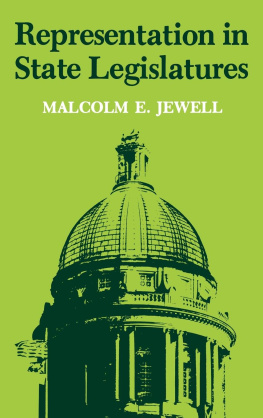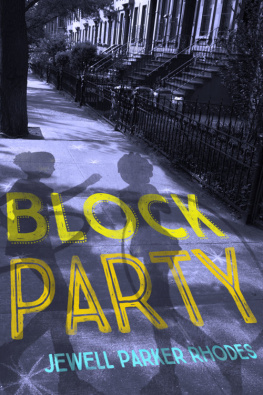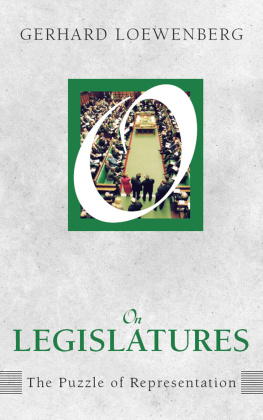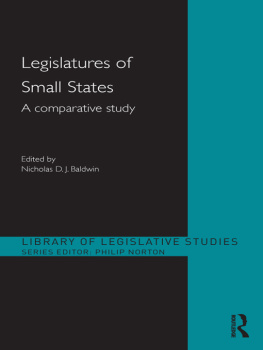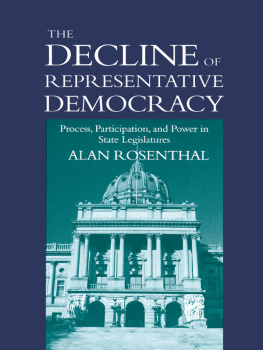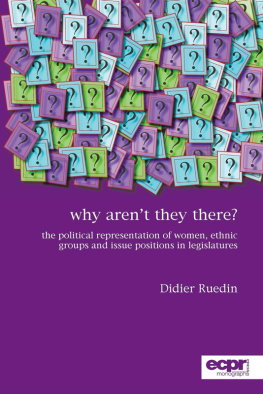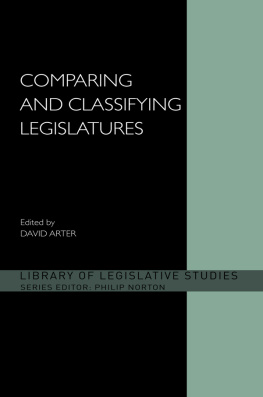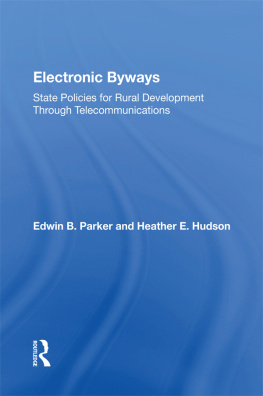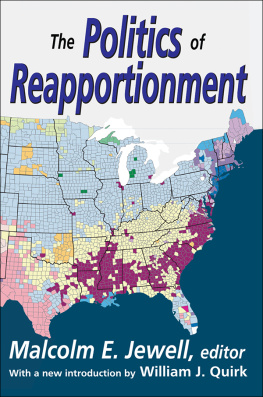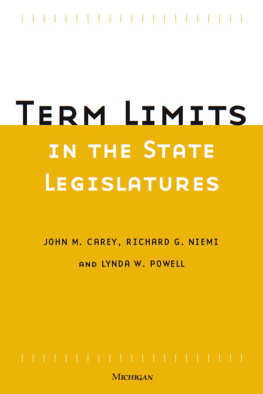Library of Congress Cataloging in Publication Data
Jewell, Malcolm Edwin, 1928-
Representation in state legislatures.
Bibliography: p.
Includes index.
1. Legislative bodiesUnited StatesStates.
2. Representative government and representation
United StatesStates. I. Title.
JK2488.J39328.73073482-40174
ISBN 0-8131-1463-2
Copyright 1982 by The University Press of Kentucky
Scholarly publisher for the Commonwealth,
serving Berea College, Centre College of Kentucky,
Eastern Kentucky University, The Filson Club,
Georgetown College, Kentucky Historical Society,
Kentucky State University, Morehead State University,
Murray State University, Northern Kentucky University,
Transylvania University, University of Kentucky,
University of Louisville, and Western Kentucky University.
Editorial and Sales Offices: Lexington, Kentucky 40506-0024
Acknowledgments
During the 19781979 academic year I held a University Research Professorship at the University of Kentucky, which made possible the trips to nine states for legislative interviews.
My most important debt is to the 221 legislators who were willing to be interviewed. In many cases my visit to the state came when there were many demands on their time, but most of those I contacted agreed to take the time for an interview. They talked frankly to me about their role as representatives and provided me with materials related to that job.
I am indebted to Helen M. Ingram and to Deborah Gona, as well as to members of the Network of State Polls, for making available unpublished data. Information on the 1978 congressional election survey was made available by the Inter-University Consortium for Political and Social Research. The data were originally collected by the Center for Political Studies of the Institute for Social Research, the University of Michigan, under grants from the National Science Foundation.
I want to thank several colleagues who reviewed the manuscript for me and who provided unusually valuable suggestions: Samuel C. Patterson, Richard F. Fenno, Jr., and Alan Rosenthal.
Naturally the various persons and institutions that were interviewed, reviewed the manuscript, and provided data and funding share no responsibility for the results reported in this book.
1.Representation in State Legislatures
In late 1978 and early 1979 I spent many weeks in the capitals of nine American states talking to legislators about how they represent their constituents. The question may appear to be a simple one, but the answers I received show that representation has many dimensions and that legislators approach it differently, depending on the state and the particular district they represent as well as their own perceptions and political styles. I found that there is no average legislator and no set of answers to the questions about representation that might be considered typical. But examples of a couple of interviews will suggest the range of meanings that are associated with the term representation.
Late one afternoon, after the Ohio House had adjourned for the day, I found a legislator who was prepared to talk at some length about his job. A thirty-nine-year-old Republican lawyer, he was just starting his fourth term in the House. When I began asking him about his district, he described it as a microcosm of the state. At the center of the district is a small but heavily industrialized city, surrounded by small towns and rural areas. His district includes almost all the county, but one rural township has been lopped off to achieve population equality. He would prefer to represent the whole county: Splitting up counties is damaging because people think in terms of counties. Im unusually lucky to have a district that is almost identical to the county, but those persons who live in the part of the county attached to another district really dont have any influence on that district.
Noting that he was elected without opposition in 1978 and won with over 60 percent in each of the three previous elections, I suggest that the district appears to be very secure for Republican candidates. He quickly replies: That is deceptive. The success of Republican candidates, including himself, is due to an unusually hard-working Republican organization that seeks and gets support from groupssuch as union members and blackswhom the Republicans usually fail to contact. Even though I ran unopposed, I spent ten days after the election at the factory gates, thanking people for voting for me.
I ask him how he develops visibility and how he maintains contact with constituents.
Anything I say is news, being the only representative in the county, like members in most rural counties. But I have the advantage of a more sophisticated media than most rural legislators have, including a newspaper, two radio stations, and a TV station.
Every other week I have a press conference in the city, and then repeat it in a couple of the small towns. These are open to the press and the public, but mostly just the press comes. I report on bills that have been passed, and my stand on them, and on my activities in the legislature and in the district.
How difficult is it to represent a district that is heterogeneous, with different and often conflicting interests?
It is not hard to represent this district. When it is that diverse, no single interest can kill you. You cant suit everyonesomeone will be mad no matter what you do, so you can make an informed judgment. It gives you a great deal of freedom.
If you explain your vote to people, and sound well informed, and report back often to them, they will forgive a few votes that they might not agree with. I tend to get into trouble with the right-wing Republicans, but the local chairman of the party says, Even if we dont always agree with you, at least give us reasons for your votes.
Do you have trouble with single-issue groups?
Not very much. The two toughest are the anti-gun control people and the antiabortion people. They are very organized and they dont agree with meI am too moderate for them. What has saved me is that in this county there is so much diversity that these small groups are swallowed upthey just are not that numerous.
How do you define the job of being a legislatorwhat are the most important parts of it, or the things you wish you could spend more time on?
Everyone here faces a problem: There are two competing job descriptions that are irreconcilable (at least in terms of the time available). You must choose between being an ombudsman or being a legislator or lawmaker. Everyone here makes a conscious or unconscious choice about how much time to spend on each. I tend to be oriented toward legislation. If I didnt devote so much attention to the media in my district, I would probably be hurt politically because I have not given that much attention to constituency service.
The young Massachusetts legislator is serving his third term, representing a safely Democratic, middle-income district in the suburbs of Boston. He enjoys talking about his job and seems to enjoy being a representative and a politician. How does he stay in contact with constituents?


